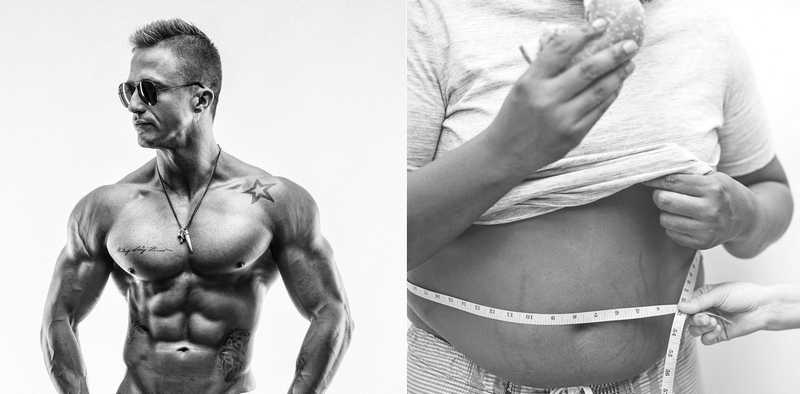Fat Loss and Gaining Muscle Mass
Fat loss is a subject of exceptional importance whether you personally need to lose fat or not. Knowing these principles you’ll be able to know how to achieve stronger body with a better physique.
There are many methods of fat loss. Here we talk losing excess body fat through proper nutrition and for even faster results – simultaneously with proper training, i.e increasing muscle mass. That’s the fastest and most effective way to lose excess fat. It carries along additional bonuses such as increased levels of physical and mental energy, better health, even more self-confidence not just because of a better outlook but because you personally achieved it all!
If you’ve had enough wandering about from advice to advice, “Drink that”, “Eat like this”, “Train like that”…, then it’s time to know the mechanisms behind fat loss and building more muscle mass.
It’s not enough to just lose weight. You need to know how it really comes to weight gain.

The most effective way to losing fat is:
DIRECTING YOUR HORMONES TOWARD BUILDING MUSCLE MASS AND BURNING FAT THROUGH PROPER EXERCISE, NUTRITION AND ADEQUATE SLEEP.
It is hormones that command the body into building muscles, burning fat, gaining weight or wasting muscles. Your diet and the way you train are one of the main factors that determine which one will prevail in your body.
Fatty tissue doesn’t come about exclusively from dietary fat
Stored body fat is composed of not only the same fat you ingested through your nutrition. Body fat is created also in the following way. You eat carbohydrates, say white bread. In the body it is broken down to simpler sugars. Part of these sugars are used for momentary energy needs, part are stored into muscles and the liver and the excess is converted to fat. This fat is stored as body fat.
To get rid of the excess fat you don’t need to starve yourself.
This is achieved with a good regime of proper diet which isn’t temporary and which with the needed tweaks can be always followed. Thus you’ll always keep positive results!
Hormones are the regulators that burn or store fat, build or waste muscle
If you have excess body fat, the solution is not to go jogging or running 2 hours every day or work out for 1-2 hours every single day of the week. Even if many people do exactly that with the intention of fat loss, what actually happens in their bodies when they exercise this way is this: each workout that lasts longer than one hour activates the hormone cortisol and keeps it higher for a prolonged period after the completion of your workout for that day. This prolonged high level of cortisol keeps testosterone low, whereas testosterone is one of the main fat burners and muscle-mass builders in the human body.






